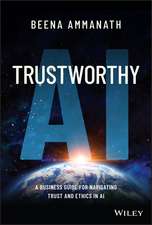Zero Latency Leadership
Autor Beena Ammanathen Limba Engleză Hardback – 25 iul 2023
History will remember our generation as agents of change. In this moment, we have the power to shape a positive legacy by harnessing the lessons of the past and committing to a better future. In a world where technology is everywhere, today's leaders wield a power to influence and create a world where trust, equity, and sustainability are foundational.
Transformations and disruptions are a constant for every organization in this era of rapidly emerging technologies. Now, more than ever, leadership is about how you handle change. How, then, do we create a new leadership model that equips us to be successful in our organizations and in society? We call it Zero-Latency Leadership.
In this book, senior executive Beena Ammanath will guide leaders along a path of technical literacy while embracing equity, sustainability, and trust as core tenets. Together, we will appraise several emerging technologies and opportunity costs and potential consequences of both rushing and delaying adoption. Weighing the complexity of both the innovations and their application in real-to-life business circumstances, we will greet the rapid evolution of technology with confidence and lead our organizations and future generations to lasting success.
Preț: 136.69 lei
Nou
Puncte Express: 205
Preț estimativ în valută:
26.17€ • 27.30$ • 21.94£
26.17€ • 27.30$ • 21.94£
Carte disponibilă
Livrare economică 19 februarie-05 martie
Preluare comenzi: 021 569.72.76
Specificații
ISBN-13: 9798887500584
Pagini: 186
Dimensiuni: 150 x 230 x 22 mm
Greutate: 0.4 kg
Editura: Advantage Media Group, Inc.
Pagini: 186
Dimensiuni: 150 x 230 x 22 mm
Greutate: 0.4 kg
Editura: Advantage Media Group, Inc.
Notă biografică
BEENA AMMANATH has been at the forefront of emerging technologies for some of the largest and most prestigious enterprises around the world. A computer scientist by education, she is an award-winning senior business executive with a career that has spanned leadership roles in finance, marketing, e-commerce, telecom, retail, software products, service, and industrial manufacturing domains with companies such as Deloitte, GE, HPE, BT, Bank of America, and numerous start-ups. She is also the founder of Humans for AI, a nonprofit focused on increasing diversity and inclusion.
Beena has advised start-ups, taught as a professor, supported a variety of nonprofits, and served on several executive boards. In all these roles, she has helped organizations pursue tech transformations that deliver innovation, competitiveness in the marketplace, and the ethical use of emerging technology. Her work has been acknowledged with numerous awards, like the Women Super Achiever Award from World Women Leadership Congress and WITI's Women in Technology Hall of Fame. She is the author of the groundbreaking book Trustworthy AI.
BEENAMMANATH.COM
Beena has advised start-ups, taught as a professor, supported a variety of nonprofits, and served on several executive boards. In all these roles, she has helped organizations pursue tech transformations that deliver innovation, competitiveness in the marketplace, and the ethical use of emerging technology. Her work has been acknowledged with numerous awards, like the Women Super Achiever Award from World Women Leadership Congress and WITI's Women in Technology Hall of Fame. She is the author of the groundbreaking book Trustworthy AI.
BEENAMMANATH.COM
Cuprins
Foreword
Part One
Introduction
History of Change
The Impact of Modern Technologies
Part Two
Quantum Computing
Blockchains, NFTs, and Cryptocurrencies
Augmented Reality and Virtual Reality
The Metaverse
Genetic Engineering
Robotics
Edge Computing and 5G
3-D Printing
Artificial Intelligence
Part Three
The Next Evolution of Humans with Emerging Technology
Leadership in the Era of Rapidly Emerging Tech
Conclusion
About the Author
Acknowledgments
Part One
Introduction
History of Change
The Impact of Modern Technologies
Part Two
Quantum Computing
Blockchains, NFTs, and Cryptocurrencies
Augmented Reality and Virtual Reality
The Metaverse
Genetic Engineering
Robotics
Edge Computing and 5G
3-D Printing
Artificial Intelligence
Part Three
The Next Evolution of Humans with Emerging Technology
Leadership in the Era of Rapidly Emerging Tech
Conclusion
About the Author
Acknowledgments


















